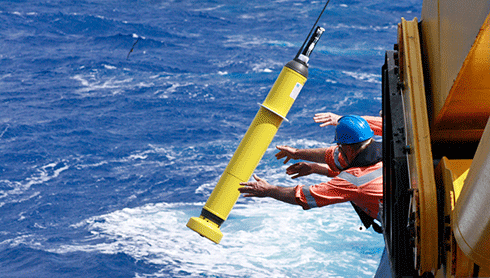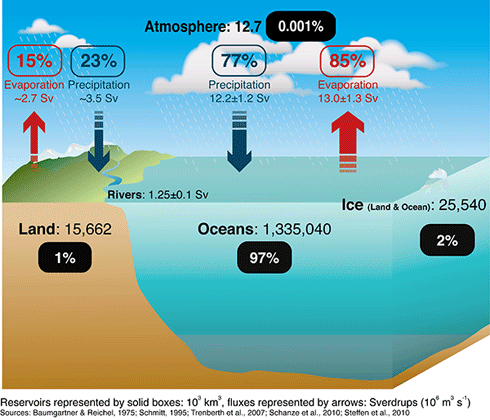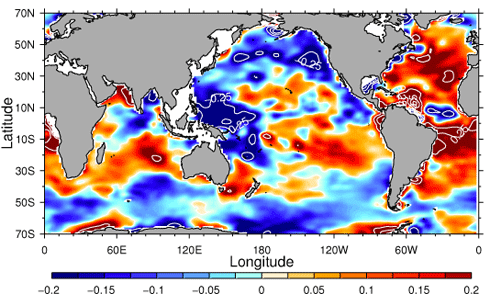
|
Published: 2 May 2012
Sea’s salt levels point to amped-up water cycle
Changing salinity levels in the oceans point to an accelerating global rainfall and evaporation cycle. Arid regions are becoming drier – and high-rainfall regions are getting wetter – faster than predicted, according to a paper by Australian and United States scientists just published in Science.1 The scientists say the changes are a ‘fingerprint’ of global warming.

|
|
A global flotilla of more than 3000 Argo robotic profiling floats provides crucial information about the upper layers of ocean currents. Credit:
CSIRO/Alicia Navidad
|
Lead author, Dr Paul Durack – from the Lawrence Livermore National Laboratory in the United States – says that by studying observed ocean salinity changes and the relationship between salinity, rainfall and evaporation in climate models, the team determined that the water cycle had strengthened by four per cent from 1950–2000. This is twice the response rate projected by the latest global climate models.
‘Salinity shifts in the ocean confirm climate and the global water cycle have changed,’ explains Dr Durack.
‘These changes suggest that arid regions have become drier and high rainfall regions have become wetter in response to observed global warming.’
Dr Durack and his CSIRO co-authors say that with the global temperature projected to rise by 3ºC by the end of the century, a 24 per cent acceleration of the water cycle is possible.
With oceans accounting for 71 per cent of global surface area, the escalating exchange between evaporation and rainfall is more clearly represented by surface salinity patterns – which are shaped by rainfall over the land and ocean and evaporation at the ocean surface – than by land-based data.
‘The ocean matters to climate. It stores 97 per cent of the world’s water, receives 80 per cent of the all surface rainfall, and has absorbed 90 per cent of the Earth’s energy increase associated with past atmospheric warming,’ says co-author Dr Richard Matear, of CSIRO’s Wealth from Oceans Flagship.
‘Warming of the Earth’s surface and lower atmosphere is expected to strengthen the water cycle, largely driven by the ability of warmer air to hold and redistribute more moisture.’

|
|
This schematic representation of the global water cycle shows the key role of the ocean and surface rainfall and evaporation fluxes. Credit:
Paul Durack
|
In the past, scientists have struggled to determine coherent estimates of water cycle changes from land-based data, because surface observations of rainfall and evaporation are sparse. However, global oceans are now providing a much clearer picture.
Dr Durack says the recent research found ‘robust evidence of an intensified global water cycle at a rate of about eight per cent per degree of surface warming’.
He points out that the change in freshwater availability in response to climate change poses a more significant risk to human societies and ecosystems than warming alone.
‘Changes to the global water cycle and the corresponding redistribution of rainfall will affect food availability, stability, access and utilisation,’ he warns.

|
|
Surface salinity changes for 1950–2000. Red indicates regions becoming saltier; blue indicates regions becoming fresher. Credit:
Paul Durack
|
Scientists have been measuring ocean salinity and temperatures for well over 100 years: most recently using sensors deployed from research and commercial vessels, Argo robotic ocean profiling floats, and satellite ocean observation instruments.
The paper’s third co-author, CSIRO’s Dr Susan Wijffels – who is also co-chair of the global Argo project – said maintenance of the present fleet of around 3500 Argo ‘ocean profilers’ is critical to observing continuing changes to salinity in the upper oceans. The Argo floats drift freely throughout the oceans, providing oceanographers with measurements of salinity and temperature down to 2000 metres.
1 Durack PJ, Wijffels SE and Matear RJ (2012) Ocean salinities reveal strong global water cycle intensification during 1950–2000. Science.



